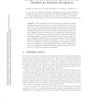376 search results - page 36 / 76 » Analysis-by-synthesis features for speech recognition |
INTERSPEECH
2010
13 years 4 months ago
2010
The Lombard effect refers to the speech changes due to the immersion of the speaker in a noisy environment. Among these changes, studies have already reported acoustic modificatio...
ICASSP
2010
IEEE
13 years 8 months ago
2010
IEEE
Prosodic information has been successfully used for speaker recognition for more than a decade. The best-performing prosodic system to date has been one based on features extracte...
ISMIR
2000
Springer
14 years 1 months ago
2000
Springer
We examine in some detail Mel Frequency Cepstral Coefficients (MFCCs) - the dominant features used for speech recognition - and investigate their applicability to modeling music. ...
COST
2009
Springer
14 years 4 months ago
2009
Springer
Abstract. The recognition of the emotional states of speaker is a multidisciplinary research area that has received great interest in the last years. One of the most important goal...
ICMI
2005
Springer
14 years 3 months ago
2005
Springer
Untethered multimodal interfaces are more attractive than tethered ones because they are more natural and expressive for interaction. Such interfaces usually require robust vision...

